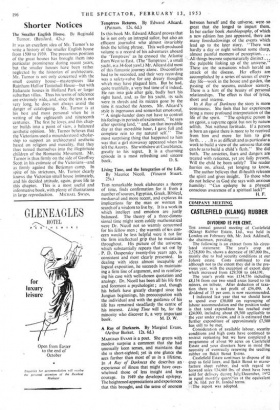A Ray of Darkness. By Margiad Evans. (Arthur Barker. 12s.
6d.) A Ray of Darkness. By Margiad Evans. (Arthur Barker. 12s. 6d.) MARGIAD EVANS is a poet. She greets with modest surprise a comment that site had unusually keen senses, and maintains that she is short-sighted; yet in one glance she sees further than most of us in a lifetime. In A Ray of Darkness she describes an • experience of illness that might have over- whelmed those of less insight and less courage. In 1949 she developed epilepsy. The heightened appreciations and experiences that this brought, and the sense of oneness between herself and the universe, were- so great that she longed to impart them. In her earlier book Autobiography, of which a new edition has just appeared, there are many foreshadowings of the events which lead up to the later story. "There was hardly a day or night without some sharp, almost painful moment of perception. . . . -All things become supernaturally distinct ... the palpable linking, up of the universe." These are the sensations which herald an attack of the disease. Her effects are accomplished by a series of scenes of every- day life—work in the house and garden, the passing of the seasons, outdoor scenery. There is a hint of the beauty of personal relationships. The effect is that of lyrics, short and intense.
In A Ray of Darkness the story is more continuous. She feels that her experiences bring a more profound interpretation of the life of the spirit. "The epileptic person is an egoist, a supreme egoist but not by nature selfish. Not without fortitude. If a person is born an egoist there is more to be received from him and more for him to give forth. . . It is as difficult and as particular a work to build a view of the univei se that one can be as to build a child's flesh." She did both. The anxieties, fears and dangers are treated with reticence, yet are fully present. Will the child be born safely? The reader hurries on, • afraid, yet longing to know.
The author believes that ill-health releases the spirit and gives insight. To those who do not believe in God she says with anxious humility: "Can epilepsy be a physical conscious awareness of a spiritual lack?"
H. F.


































 Previous page
Previous page